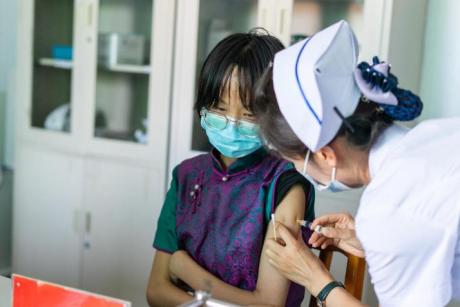In the wake of World War II, 193 countries came together to ratify the United Nations Universal Declaration on Human Rights a historic milestone that has underpinned efforts to improve the health and wellbeing of marginalized and vulnerable people around the world. But without stronger mechanisms of accountability, such proclamations may become little more than empty promises, a group of international health experts warns.
The group, comprising global and public health researchers from more than a dozen countries, recently completed a three-year study as part of the International AIDS Society-Lancet Commission on Health and Human Rights. Its final report, published March 21 in The Lancet, points to an “alarming deterioration of human rights over the past two decades” that poses serious risks to the health of millions of people around the world.
The report cites multiple colliding forces – including glaring gaps in access to healthcare, systemic racism, environmental threats such as climate change, and conflicts in multiple parts of the world where healthcare workers and other civilians have been deliberately targeted – that are undermining the centrality of human rights. But it also notes the failure of leaders, including international health governance organizations, to condemn or seek sanctions for those abuses.
“What we’ve seen unfortunately across so much of the landscape at the current moment is impunity for rights violations -- violators not being held accountable, and rights holders losing their rights without accountability,” said Chris Beyrer, M.D., director of the Duke Global Health Institute and co-chair of the commission.
Human Rights Under Threat
Beyrer joined fellow commissioners and other health experts during a virtual event on March 25 to announce the commission’s findings. Its recommendations include reforming international health agencies and building stronger ties between health practitioners and social justice organizations to bring greater emphasis on human rights in healthcare practice and policy.
“If we truly are committed to addressing these huge global challenges, there needs to be serious discussion around transformation of international health governance to align with a health and human rights framework,” said Adeeba Kamarulzaman, M.D., co-chair of the commission and pro vice-chancellor and president of Monash University in Malaysia.
DGHI hosted a virtual event to discuss...
Other recommendations in the report include developing standards to measure health disparities and stronger methods to monitor countries’ success in upholding human rights. The commission also advocated fora greater emphasis on human rights in medical education and training. “It is us in the health community that first and foremost need to recenter human rights in our own health practices,” Kamarulzaman noted.
Beyrer said the 76-year-oldUnited Nations accord on human rights put a focus on human dignity as a foundational principle of healthcare, helping propel progress on diseases such as HIV/AIDS and demands for equitable access to medical care. But a recent spate of laws in many countries criminalizing sexuality or restricting access to reproductive health demonstrates that such ideals are not absolute, he said.
“That centering of human dignity at the heart of healthcare has not changed, but it needs to be reaffirmed and held up,” he said. “We all know and feel and see when dignity has been violated.”
Richard Horton, M.D., editor-in-chief of The Lancet, said the commission’s recommendations could not be more timely, as the world confronts human rights transgressions in multiple ongoing wars and humanitarian crises. Reversing that trend is “a daunting challenge,” he admitted, but not an insurmountable one.
““For some, human rights are seen as a kind of unattainable set of goals, even utopian goals, that are judged meaningless in the rough world of realpolitik,” Horton said. “But as this commission shows compellingly and convincingly, nothing could be further from the truth.”
Expert Reactions
During the March 25 event, three global health researchers who were not part of the commission offered comments on the report.
Parveen Parmar, M.D., director of academic programs for the Institute on Inequalities in Global Health at the University of Southern California Keck School of Medicine, echoed the report’s emphasis that human rights should not be considered in isolation. She noted that implementing the report’s recommendations needs to be an interdisciplinary effort, involving “engagement with policymakers, economists and activists, and I think centrally, communities as well.”
“The language of human rights is so critically important, but I think we can do a better job of making it relevant and understandable to people from different communities,” Parmar said.
Rajat Khosla, director of the United Nations University International Institute for Global Health, noted the impact of the “multiple intersecting crises” discussed in the report on populations that are already experiencing significant hardship, such as migrants displaced by conflict, racial discrimination or climate change.
“The impact of these multiple intersecting crises on such populations is catastrophic,” Khosla said. He called the inability to hold those responsible for creating such conditions accountable a “failure of leadership,” underscoring the need for stronger international governance.
Salim S. Abdool Karim, M.B. ,Ch.B., director of the Centre for the AIDS Programme of Research in South Africa and a professor of global health at Columbia University, said the report “makes a very compelling case” that the health of all citizens is not reachable without a strong emphasis on human rights. He noted vaccine hoarding by rich countries during the COVID-19 pandemic as an illustration of how backsliding on the priority of human rights has worsened health disparities.
“We saw how global greed created this unconscionable inequity in access to biological countermeasures such as diagnostics, vaccines and oxygen,” Karim said. “We failed as a global community to stand as one against a common enemy.”



